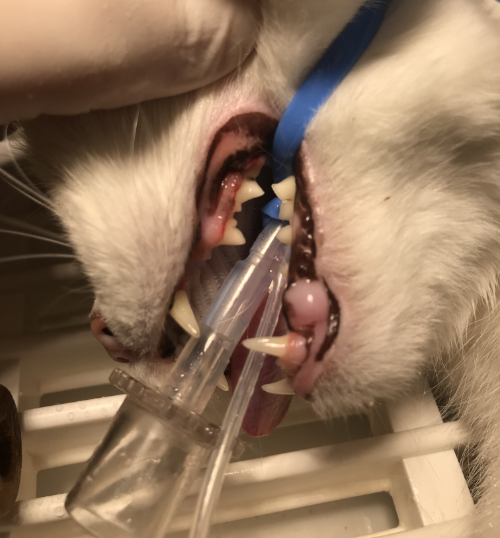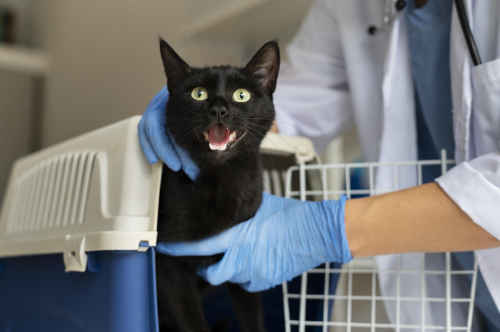Why does my cat meow but no sound comes out?
When a cat has lost his voice, its vocal cords are not working as they should. They should make a certain vibration when your cat wants to meow and if they sound hoarse then there will be a less powerful vibration or even no vibration at all. This makes your cat’s voice sound different than you are used to from it. Your cat then suddenly may have lost his voice. In this article we explain what the causes of losing his voice might be.
Causes and treatment for your cat to lose his voice
Respiratory infections
Respiratory infections in cats, such as cat flu, among other things, cause the throat to become inflamed. The mucous membrane in the throat swells. In that case, the vocal cords can also become swollen and therefore more rigid. The vibration they make to produce sound then changes, which makes the sound they make sound different. In other words, your cat is meowing hoarsely or has lost his voice at all! As long as your cat doesn’t look too sick, you don’t have to do anything. It generally resolves on its own. But if you still want to give something to your cat to help him, you can use Cough and throat relief. This counteracts the swelling of the airways. So also the swelling of the vocal cords. That way your cat should soon recover from the fact that he has lost his voice.
Excessive meowing
When cats meow very often and especially loudly, their vocal cords can become overstressed. The vocal cords are actually a little bit irritated in that case. This also usually heals on its own, as long as your cat meows less. Reasons for excessive meowing include: asking for attention when they are bored, nagging for food or water, marking his territory or dementia. But also if they are in excessive pain. We see this, for example, when a male cat cannot urinate. In such a case he will often try to go to the litter box to urinate without a large pee coming out.
The already mentioned Cough and throat relief can also help to counteract the irritation and accompanying inflammatory reaction in the case of excessive meowing. But of course, your cat will not recover from his lost voice if the reason for the loud meowing doesn’t resolve. So make sure he/she is neutered/sterilized if he/she is not already, give more play opportunities and provide food and water on time. Of course, preventing pain is not always possible. And dementia is also difficult to solve.
In the snuffle mat for cats above, you can hide some tasty treats that your cat will love. He is then quite busy looking for his prey (so prevents boredom) and is then no longer hungry. Your cat usually recovers soon from his lost voice if boredom or hunger was the cause.
Irritation of the throat
When there are irritating substances in the air, it can affect the airways. By this we mean cigarette smoke, smoke from the stove or BBQ, exhaust fumes, smog and chemicals (paint, cleaning agents, solvents, air fresheners, pesticides). As soon as you take your cat out of the room with these irritating substances, the complaints that cause your cat to lose his voice usually disappear within half an hour. Further treatment of the throat is rarely necessary.

Polyps or growths
Cats generally have polyps quite often. These are a kind of tissue balls in the shape of a mushroom. But very small. They basically grow in all cavernous organs of the body, but can also grow on the vocal cords. Due to this piece of proliferation on your cat’s vocal cords, it is possible that his voice changes because the vocal cords cannot vibrate normally. As a result, your cat may lose his voice.
It is also possible for a cat to form a tumor on its vocal cords. But this is rare in cats. It generally concerns older cats. But the difference with a polyp is quite difficult to see and certainly not without anesthesia.
Both polyps and tumors can be surgically removed by your vet. This is not strictly necessary for polyps, but it is for tumors. After all, it could be cancer. However, the difference is difficult to determine in advance. Your vet will probably also choose to remove the growth and have them sent to a lab for further examination. This way you know whether it is a polyp or a (cancerous) tumour. Then you know whether or not you need to operate again in the future if it comes back.

allergies
It is also possible that a cat has an allergic reaction based on pollen, dust mites, etc., resulting in swelling of the airways in the throat. However, this usually does not happen often in the cat and if it does, your cat often also has respiratory problems. Your cat then has other problems than just that your cat suddenly has lost his voice. Asthma attacks, for example, are such an allergy. If your cat suffers from this, you should take him to your vet. Not because of the fact that he lost his voice, but because of the breathing problems.
Injuries
Did your cat get a neck bruise as a result of an accident? Then his vocal cords can also become quite swollen or even damaged. In this case, it is wise to take him to your vet to rule out more serious problems that also occur. For example, internal bleeding. If it’s just the fact that he’s lost his voice and he’s not having trouble breathing then you can give it a few days. Your cat will usually recover within a week.
Paralysis of the nerve that controls the vocal cords.
The nerves that control the vocal cords can become paralyzed as a result of an accident, surgery, or rare nerve disorders. As long as it only concerns paralysis of the vocal cords, then it is not a big problem. But the nerve that controls the vocal cords has multiple functions elsewhere in the body, so it’s important to have your vet check that this nerve still controls the other areas.

cat lost his voice right after surgery.
Has your cat been under anesthesia very recently and is now lost his voice? Then the cause is most likely the tube he had in his throat during anesthesia. That tube goes down his throat to ensure that his airways remain open and your cat will not suffocate. So very important! But that tube slides along his vocal cords. These can sometimes get a little irritated by the tube. This will improve in a few days and your cat will soon have his voice back. You don’t have to do anything about this.
What should you do if your cat has lost his voice?
observe
In the first place you will observe him closely. That means you keep a close eye on him and see what he does. Does he eat normally? Does he drink normally? Is he as lively as ever? Does he seem to be in pain? If everything else seems to be normal then you can wait for a week and see what happens. You can possibly give Cough and throat relief medicin to your cat to counteract the swelling in his vocal cords. But in principle it also heals without that drug.
Deviant behavior
If your cat does show abnormal behavior, it is wise to go to your vet and have your cat examined. This is especially the case if he has difficulty breathing or if he sleeps much more than usual. If you are not used to your cat meowing plaintively, there is a chance that he is in pain. Try to find out where the pain is. Feel especially in his abdominal cavity in the back, just in front of his pelvis. Do you feel a hard ball there or does he clearly indicate that it hurts extra? Then his bladder may be blocked. And then you need to go to a vet urgently. So also on weekends or evenings.
If your cat shows only slightly different behavior or has clear signs of cat flu (dirty eyes, runny nose and sneezing), you can also wait and see what happens. However, your cat should keep eating and not feel overly ill. Usually cat flu is resolved after 7-14 days. Other illnesses usually resolve themselves more quickly. And in the meantime, of course, he must not get any sicker. Otherwise, it is still better to take him to your vet. Better safe than sorry!

What will your vet do to find the cause why your cat has lost his voice?
First, your vet will physically examine your cat and hopefully come to a diagnosis. That works in many cases. You will usually receive an anti-inflammatory medicine and possibly a course of antibiotics. If your vet doesn’t know either, there’s a chance they’ll advise putting your cat under anaesthesia and looking at his vocal cords with a camera. That way they can usually assess what the reason is and what the treatment should be. Is there a polyp or tumor? Then they will immediately try to remove it. After that your cat will heal from his lost voice.


